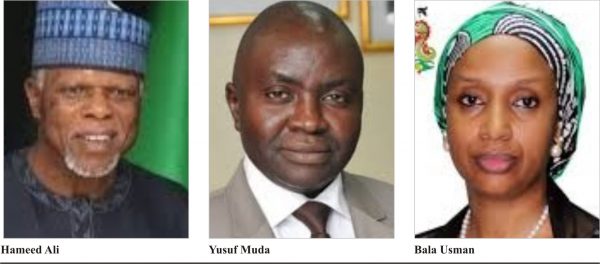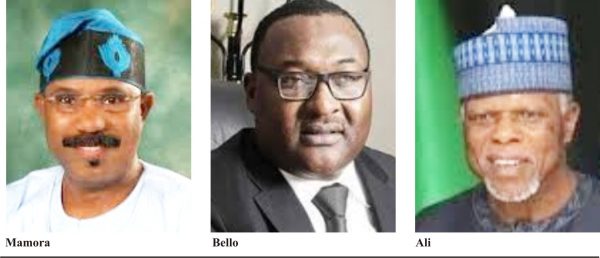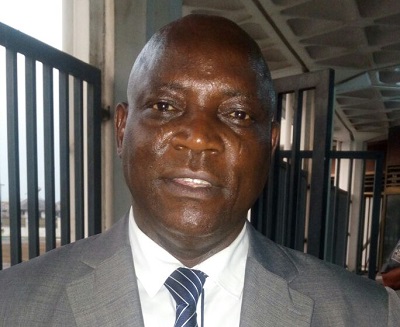Nigeria Ports And The Mystery Of Scanners

By Kenneth Jukpor
Despite Nigeria’s hope to emerge hub port in the West and Central Africa sub-region, cargo examination is subjected to 100% physical examination at all ports as well as border posts in the nation. The problem has led to gross delays in port processes as long hours are spent by officers of the Nigeria Customs Service (NCS) to inspect containers that should have been electronically scanned with scanners.
This delay has also affected shipping lines as their containers are stuck in the country while loaded containers are lined up for examination occupying space that would have been used for storage of empty containers heading back to the exporting nations.
The absence of scanners and need for human physical examination has also heightened the cases of corruption and bribery as some Customs officers connive with freight agents to shortchange the government and enrich themselves.
It is the duty of the Federal Ministry of Finance to provide these scanners but the rigmarole and conflicting stories has left industry observers wondering if the government genuinely wants to correct the unfortunate operational environment at the ports. The Managing Director of Nigerian Ports Authority (NPA) Ms Hadiza Bala-Usman stressed this challenge at the 3rd Maritime Stakeholders Conference as she admonished the Minister of Transportation, Hon. Rotimi Amaechi to explore avenues to discuss with the leadership of Customs as well as the Finance Minister on the need to get scanners working at Nigerian ports.
According to Hadiza, lack of scanners at the ports which led to the subjection of all cargoes st ports to physical examination by Customs, has become the major reason for congestion at the ports.
She said; “There is a serious challenge we have at the ports which might have been overlooked during the Ease of Doing Business initiative. It is the issue of scanners at our ports. Right now, all the cargoes that come into Nigeria are being examined physically. If you look at the tonnage of cargoes that come into Nigeria, and all of them being subjected to physical examination, that automatically translates into congestion”
“Scanners at our ports will facilitate the examination of cargoes. With scanners, there won’t be need for waiting time, where a terminal operator will have to position a container and different agencies of government then queue up to examine its content” she added.
After a tour of the nation’s biggest container terminal, AP Moller Terminals last week, our correspondent observed that there were scanners but the terminal operators lamented that they were dysfunctional.
The General Manager, APMT External Affairs Manager, Mr. Daniel Odibe admitted that the problem of scanners had seen the number of containers handled on daily basis at APMT fall below 200 when the terminal had the capacity to treat more than 400 containers daily.
Odibe also revealed that lack of confidence in the scanners by the Customs had seen the officers insist on physical examination after scanning.
The Controller of Apapa Customs Service, Comptroller Mohammed Abba-Kura also confirmed the issues with scanners at Apapa, noting that an expert was sent to inspect the scanners in the penultimate week, however he couldn’t disclose if the contractor had been given the contract to repair the scanners.
The Apapa Controller lamented that the challenges with scanners in the country was influenced by politics, “The contract was given by the Ministry of Finance to the service provider which is Cotecna SGS. In fact, six months before Customs took over the management of these scanners there was the problem of low maintenance as the Ministry of Finance handed it over to a service provider that wasn’t technically placed to handle the equipment. So, Customs inherited epileptic scanners and we have been using it that way as sometimes they work, at other times they don’t work”
According to Abba-Kura, the scanners in Apapa are modern compared to the ones utilized in London Dover Port, but the problem has been the aspect of maintenance and the multiple stakeholders at the ports.
Recall that the Comptroller-General of Customs (CGC) Col. Hammed Ali (Rtd.) has given several timelines in the past for the acquisition of new scanners that never materialized. The Customs helmsman has probably been left in the limbo by the Finance Ministry on this issue.
Nevertheless, the situation at the Seme-Krake joint border-post may indicate that the Customs have no inclination to use scanners. Almost nine months after the European Union availed Customs at Seme border-post a brand new scanner to aid their operations; the equipment has been jettisoned with the Command content with manual examination.
When quizzed about the abandonment of the equipment six months ago by our correspondent, the Seme Border Customs Area Controller (CAC) Comptroller Mohammed Garba, said that the Command was awaiting clearance by the Nigerian Nuclear Regulatory Authority (NNRA) on the equipment, assuring that the equipment would be utilized as soon as NNRA approved. The scanner is yet to be utilized despite Compt. Garba’s assurances.
Some industry experts have expressed worries that top placed Nigerian politicians, businessmen, Customs officers as well as influential persons in the Finance Ministry want the status-quo at Nigerian ports to remain the same. Functional scanners would put an end to the rewarding business of bribery following wrong declarations as well as other sharp practices.
As the final destination of over 60% of the cargoes coming into the West African region, Nigeria needs efficient scanners at ports to facilitate cargo clearing and truly guarantee ease of doing business at the ports.
Reacting to this problem, the Director General, Lagos Chamber and Industry (LCCI), Mr. Yusuf Muda, stated that the government needed to prioritize the deployment of scanners at the ports.
He opined that the incessant complaints of smuggling of arms and ammunition as well as drugs and other dangerous items, would be curbed with the deployment of scanners.
“It is shocking to realize that in an economy as big as Nigeria, we still examine cargo physically. The bureaucracy of procurement needs to be revised when procuring items needed by the Customs to do their work. Why should scanners at the port be down considering the huge amount of money generated on a daily basis?” he quiered.
With the deployment of this technology, all the energy and resources wasted to stem smuggling of drugs and dangerous weapons into the country would not be necessary and the rate of these criminal activities would reduce.
Are the sponsors of these criminal activities at Nigerian ports the negative influence on the government shielding its attention from this germane issue? Do the Customs really want to eschew human contact and the endemic, yet extremely reward benefits it comes with? Why has the new scanner at Seme border not been deployed since it was mounted in February?
Some concerned stakeholders have also lamented that the bureaucracy associated with procurement process in Nigeria has made it impossible to speed up the purchase of scanners for the ports. If that is the case, what options are available to expedite the purchase of scanners?






